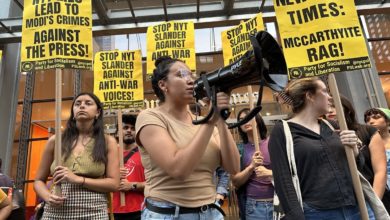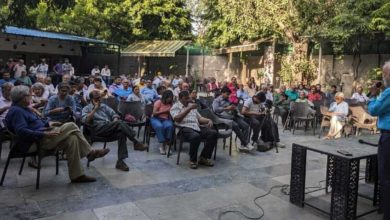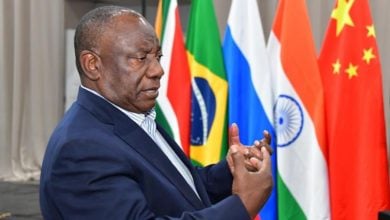
On Aug. 28, five civil rights activists (Gautam Navlakha, Varavara Rao, Vernon Gonzalves, Arun Ferreira and Sudha Bharadwaj), were arrested in India on trumped-up charges. They were accused of causing the violence that took place in the village of Bhima Koregaon at the beginning of this year in the state of Maharashtra. Along with raids in June, these arrests have brought the total number of activists arrested to 10. The five were also accused of plotting the assassination of Prime Minister Narendra Modi. The government has made the accusation that these five activists have connections to the ongoing Naxalite Rebellion in the East of the India and are “Urban Naxalites” or” Urban Maoists.” This comes as Narendra Modi and his Bharatiya Janata Party lose popularity because of their bigotry and failed economic policies.
To understand why this is taking place we must turn to the history of Bhima Koregaon. Some 200 years ago, on Jan. 1, 1818, a battle took place in this village between the Peshwa faction of the Maratha Confederacy and the British East Indian Company. The British forces were mainly made up of native Mahars, a Dalit (so-called “untouchable”) community native to Maharashtra. This battle was a British victory but is celebrated by Mahars and other Dalits as a victory of Dalits over the upper caste Marathas and not a victory of foreigners over natives. This history was popularized by B. R. Ambedkar, Dalit activist, writer of the Indian Constitution, and a Mahar himself.
This year, a march was planned by Ambedkarites to mark the bicentennial of this battle and to direct attention the continuing struggle against caste-based discrimination. The march organizers compared the Peshwas to those upholding Hindutva, the right-wing ideology behind the ruling BJP party. According to Jan. 20 secret state documents released only recently, local Hindutva ultras were organized in a conspiracy by Hindutva leaders Sambhaji Bhide and Milind Ekbote to attack the Dalits’ march, leading to clashes across Western Maharashtra in which at least one person died.
Hindutva is a right-wing ideology centered on the idea of Hindu Nationalism and it is the guiding ideology of the Rashtriya Swayamsevak Sangh. The BJP is the political arm of the RSS. These two organizations along with countless other organizations, from unions, charitie, and groups of strongmen like those who attacked the Ambedkarite protesters, together form the Sangh Parivar, meaning Organization Family. Narendra Modi, prime minister and a member of the BJP, has been in power nationally for four years. The BJP has been in power in many states across India for many years as well. For example, Gujarat, where Modi was the chief minister for a decade, has been under BJP rule for at least 20 years.
The BJP came to power nationally in 2014 making many promises of combating corruption and developing India. Four years have gone by and the BJP government has done little to nothing to combat either and instead has passed reforms that only benefit the ruling class. Demonetization and the Goods and Services Tax have hurt hundreds of millions of working-class Indians. Their situation wasn’t that good to begin with, and the BJP has done nothing to improve the situation for workers or farmers. This has led to an increase in protests from workers and farmers.
Instead of helping the workers and farmers of India, the BJP has continued to do what they do best: stoke bigoted hatred to distract the masses. This has led to pogroms and lynchings against Muslims. There has been an increase of caste-based violence. And there have been attacks, and even assassinations of journalists and activists as a form of intimidation and distraction. Still, workers, farmers and oppressed people have only increased their protests and demonstrations, winning some victories. Recent polls showing BJP losses in upcoming elections in the states of Rajasthan, Madhya Pradesh, and Chhattisgarh, all of which are BJP strongholds. This has put the BJP in a difficult position with few options.
This leads us back to the five activists who were arrested. By labeling these five as “Naxalites,” the BJP is trying to criminalize communists and Dalit activists. Naxalites are members of the illegal Communist Party of India (Maoist). They are revolutionaries found primarily in Eastern India. They are made up mostly of Adivasi peasants, and they fight for the rights of Adivasi and other oppressed peoples. Adivasi (meaning First-Inhabitants) are tribes that still live in heavily forested and hilly areas of India. Many of these areas are rich in natural resources, leading rich capitalists to legally and illegally push the Adivasi off their land for coal and iron mining, which is why many of the Adivasi join the struggle. They have been brutally suppressed by both the BJP government and the previous Congress government.
In addition, many socialists and communists have not taken up armed struggle, such as the Communist Party of India (Marxist), which controls the state of Kerala. In terms of the Dalit struggle, the Ambedkarites have taken a reformist route to bettering their plight. It was Ambedkar who wrote the Constitution and he did so in the hopes that his community could wield it to free themselves. This has not stopped the BJP from conflating the Ambedkarites and “above ground” Adivasi with Communists from the underground Communist movement. This along with the BJP’s normal oppression has led to an anti-Hindutva alliance between Marxists and Ambedkarites. This alliance has played an increasing role in protests and elections, which has the Sangh Parivar worried.
It has become obvious to many people that the BJP and Modi are incapable, and even unwilling, to improve their situation. The BJP has nothing to offer but bigoted distractions and intimidation through attacks like this against Ambedkarites and Marxists. That fear is easily overcome when one has nothing to lose. As the BJP’s popularity drops and the 2019 national elections draw closer the BJP will, as they have before, utilize these tactics to try and distract the public, whip up their base, and change the conversation from economics to inter-religious or caste-based hatred in hopes they can hold on to power. Still, the BJP ought to keep in mind that it is the people who make history and not prime ministers. Modi and the BJP can do all they want to stay in power, but at the end of the day if the Indian people want dignity and real change, there is no power on this Earth great enough to stop them.





